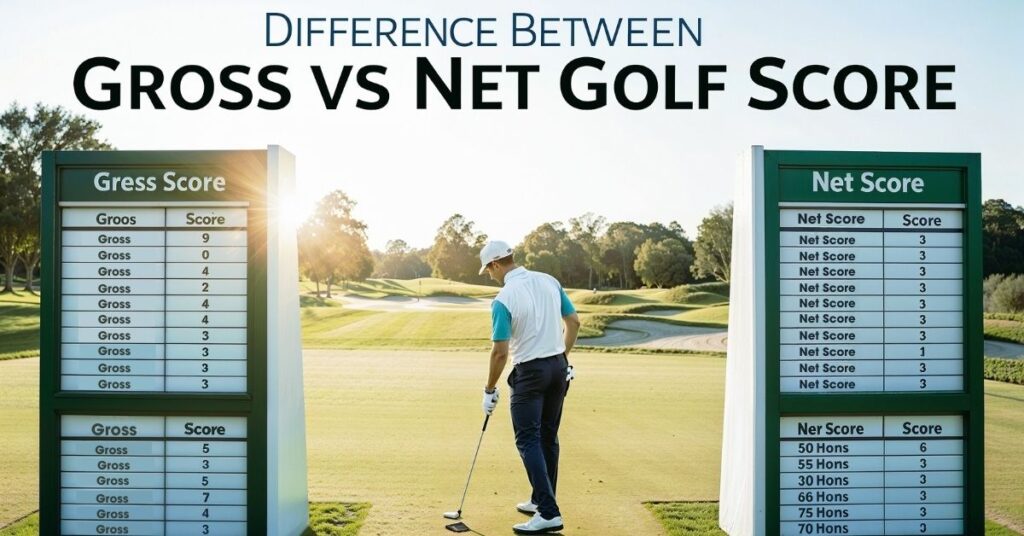When I first started playing golf, I quickly realized that scoring wasn’t as simple as just counting the number of strokes. Terms like “gross score” and “net score” kept popping up, and I wasn’t sure what they really meant or how they affected my game. If you’re here, you’re probably in the same boat—wondering how these scores work and which one matters more for your own golf performance.
Understanding the difference between golf gross vs net scores is crucial, especially if you’re trying to improve your game or compete in tournaments. Did you know that, according to the National Golf Foundation, about 55% of amateur golfers regularly compete in tournaments where these scores play a significant role? That means if you’re serious about golf, knowing the difference isn’t just helpful—it’s essential.
In this article, I’m going to break down the differences between gross vs net golf scores in a way that’s easy to understand, even if you’re new to the game. Let’s clear up the confusion and help you get a better handle on your golf scoring, so you can focus on what really matters—improving your game.
Table of Contents
ToggleWhat Is Gross Score In Golf?

When we talk about a “gross score” in golf, we’re simply referring to the total number of strokes you take during a round, without any adjustments. It’s the raw, unfiltered number—every drive, putt, and chip counted from the first tee to the final hole.
Considering the gross score golf to be the most precise measure of your course performance. If you shoot 90, that is your gross score, plain and simple. There is no consideration for your handicap or other variables. It is the purest kind of scoring and provides a clear picture of how you performed that day.
Gross scores are frequently used to decide winners in competitive play, particularly in professional tournaments. The player with the lowest gross score wins, which is understandable because it is based on real strokes taken with no changes. This score is the easiest way to assess skills because it shows your ability to navigate the course under the same conditions as everyone else.
You need to understand your gross score as it serves as the foundation for calculating your golf net score and measures the level of your performance.
What Is Net Score In Golf?

Now, let’s discuss the ‘‘net scores.’’Just like the gross score, the net score is defined as the sum of strokes, but the net score factors in your handicap. Handicap is the numerical rating that represents the ability of a golfer; it is used to get an equal chance to every player on the field, particularly when there are players of different ability levels competing for a particular match.
Your net score is calculated by subtracting the handicap from your gross score. For example: actual score 90 and the handicap is 15 then, the net score is 90-15=75. This is an adjusted total score which is then used to compare with the total net score of other players in the event in order to see where you stand in the competition.
One of the huge benefits that comes with the use of the net score is it makes the play fair for all the golfers. It understands that people are not similar in skill levels and gives beginner players a fair chance to win. This is why net scoring is normally used during club trophies and friendly matches; the purpose is to make a game productive and interesting to all the players.
Understanding your net score is crucial for participating in most club tournaments and informal games, as it highlights your true potential on the course.
Advantages Of Gross And Net Scoring In Golf

When comparing net vs gross golf, each has its own unique advantages that cater to different aspects of the game. Here’s a closer look at the benefits of both:
Advantages Of Gross Golf Score
- Pure Skill Measurement: The gross score reflects your actual performance on the golf course, with no adjustments. It’s the most accurate way to gauge your skill level and track improvement.
- Fair Comparison in Tournaments: In professional or high-level amateur tournaments, gross scores ensure that the best player wins based on their raw talent and ability.
- Objective Benchmark: It provides a clear and objective benchmark for setting personal goals, as you can directly compare your scores from one round to another.
- Encourages Consistency: Since every stroke counts, gross scoring pushes you to play consistently well throughout the entire round, without relying on handicaps or adjustments.
Advantages Of Net Golf Score
- Level Playing Field: Net scoring system helps golfers of varying skill levels compete fairly, making the game more inclusive and entertaining for all.
- Motivating for Beginners: Net score provides less experienced players with the opportunity to win or perform well, even against stronger opponents, which may be quite motivating.
- Golf Handicap Utilization: It makes full use of your handicap, turning it into a strategic tool that can influence your approach to the game and help you improve specific areas.
- Enhanced Participation: In Golf club events or friendly matches, net scoring encourages more participation, as players feel they have a genuine shot at success regardless of their skill level.
By understanding these advantages, you can see how both golf net vs gross scores play vital roles in different contexts, whether you’re pushing yourself to achieve personal bests or enjoying a competitive round with friends.
Related Article: How To Read A Golf Scorecard: Explained For Beginner
How To Calculate Gross And Net Score In Golf

Understanding how to calculate gross and net golf Score is essential for measuring your development and competing equally across formats. Let us break it down step by step.
Right Way To Calculate Gross Golf Score
The gross score is your total number of strokes taken throughout a round of golf. It’s the sum of every swing, putt, and penalty stroke from the first tee to the final hole.
Steps To Calculate The Gross Score:
- Track Every Stroke: Count each time you make a stroke at the ball, including every putt on the green. If you incur a penalty (such as hitting the ball out of bounds), be sure to include those penalty strokes in your tally.
- Add Penalties: Whether you are in a hazard, or you have violated the rules of golf, or are out of bounds then some additional penalty shots are added to your raw score.
- Sum Up at the End: Finally, when you have played all 18 holes sum up the number of strokes noted in each hole to come up with the gross score of the round.
For example, if you played 18 holes and recorded individual hole scores like 4, 5, 3, 4, etc., your gross score would be the total of those numbers. So if your total adds up to 92, then your gross score is 92.
Right Way To Calculate Net Golf Score
The net score adjusts your gross score by subtracting your handicap, providing a score that accounts for your skill level and allows you to compare against other golfers of varying abilities.
Steps To Calculate Net Golf Score
- Know Your Handicap: Your handicap is a numerical value that reflects your golfing ability. The lower your handicap, the better your average performance. For example, a handicap of 10 means you’re typically 10 strokes over par.
- Subtract Your Handicap from Gross Score: Once you have your gross score from your round, simply subtract your handicap from that total.
- For example, if your gross score is 92 and your handicap is 18, your net score would be 92 – 18 = 74.
The net score provides a more competitive number, primarily in club tournaments when players employ handicaps to maintain fairness in play when competing with other golfers of different skill levels. In the case of a tournament, then the player with the least total net score is considered the winner.
Also Read: Detailed Guide About Average Golf Score For Beginners?
Difference Between Gross Vs Net Golf Score

It is necessary for any person to understand the difference between gross and net scores to become a better golfer. Though both scores represent a golfer’s performance, they measure it in different ways, each with its own purpose and application.
Purpose
Gross scores reflect your true golfing ability and are used to determine how well you performed overall. They are frequently used in professional tournaments and to assess personal growth. Net scores, on the other hand, adjust for skill differences, making them more suitable for club tournaments and casual play where players of different abilities compete against each other.
Calculation
To find your gross score, simply total the number of strokes you took throughout the round. To calculate your net score, subtract your handicap from your gross score. For instance, if you have a gross score of 85 and a handicap of 10, your net score would be 75.
Impact On Competition
In a tournament with gross scoring, the player with the lowest total score wins, indicating the best overall performance. In a net-scoring competition, the player with the lowest net score wins, considering varying skill levels and providing a more equitable comparison.
When To Use Gross or Net Score In Golf Tournaments?

Choosing whether to use net and gross in golf score tournaments depends on the nature of the event and the goals of the competition. Here’s when to use each type of scoring:
Gross Score Tournaments
These are frequently used in high-level competitions, such as professional tournaments and certain amateur events. Gross scoring is suitable for rating players on their raw skill and performance. It ensures that the winner is selected by the lowest number of strokes taken, indicating the best overall golfer in a fair and transparent manner. In these competitions, every stroke counts, and the competition is typically amongst players of similar ability levels.
Net Score Tournaments
Most players use net scoring during club tournaments, charity events and casual tournaments where different standards players play. To make the competition fair, the net scoring method calculates scores based on the two players’ handicaps. This ensures that the two players can fight it out on the field at near equal strength, reducing the fact that the golfer is up against a professional. They are especially important in events designed with the objective of being enjoyable for everyone in the party, not only the high-ranked players. Net scoring also maintains the attention level of a large audience by providing as many possibilities to win as possible.
Conclusion
Understanding the difference between gross vs net golf scores is crucial for any golfer. Gross scores reflect your total strokes and are used to measure pure performance, which is ideal for high-level tournaments. Net scores, adjusted for your handicap, level the playing field, making them perfect for club events and casual play.
Understanding when to use each type helps you compete effectively and track your progress. Whether aiming for personal improvement or participating in various tournaments, knowing these scoring methods ensures a better golfing experience and helps you reach your goals.
FAQ's
It depends on the context. Gross scores are more important for assessing pure skill and performance, especially in professional tournaments. Net scores are more important for leveling the playing field in club events and casual play, where players of different skill levels compete.
In golf, “gross” refers to the total number of strokes a player takes to complete a round, without any adjustments or handicaps.
Stableford scoring is typically net, as it adjusts for each player’s handicap.

With several years of experience in golf, Golf Golz are dedicated to helping golfers elevate their game through innovative training techniques, premium equipment, and expert insights. From mastering your swing to conquering the course, we bring you strategies and tools designed by world-class instructors to help you play your best golf yet.



